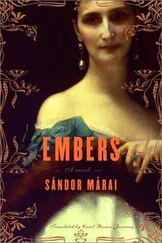W hen Lajos first appeared among us, which seems a very long time ago, Laci was effusive in his welcome. Both were rehearsing the family role of “men of great promise.” Nobody could say what exactly it was that Lajos and Laci “promised,” though if you listened long enough to either of them both would have promised a great deal. The resemblance between their characters — the complete lack of any sense of reality, the tendency to unproductive dreaming, a compulsion to tell unconscious lies — drove them together with such irresistible force they might have been lovers. How proud Laci was when he introduced Lajos to the family! They even looked like each other: both their faces radiated something of the last century’s romantic glow, a quality I liked in Laci and that helped me warm to Lajos. There was a time when they dressed like each other, and the town was full of stories of their frivolous, grand-sounding antics. But everyone forgave them because they were young and charming and hadn’t actually done anything scandalous. They were frighteningly alike in both soul and body.
This friendship, which even in their university years had an unsettling air of intimacy, did not cease when Lajos started showing interest in me: it did not cease but rather changed in an odd way. Even a blind man could see that Laci was ridiculously possessive of Lajos, doing everything he possibly could to make his friend part of the family while at the same time disapproving of Lajos’s courtship, interrupting our clumsy moments of togetherness, mocking the uncertain signs of our increasing mutual attraction. Laci was possessive, but in an extraordinary — or perhaps not so extraordinary — way he directed his jealousy only at me and appeared to be happy when Lajos married Vilma, behaving throughout with the utmost tenderness toward them, prepared to sacrifice anything for their happiness. Everyone in the family knew that I was Laci’s favorite, the one for whom he had a fond spot. Later I even thought that Laci’s opposition and antagonism might have played some part in Lajos’s infidelity. But this wasn’t a hypothesis I could ever prove, even to myself.
These two similar people, these two almost identical characters, rivaled each other in friendship. Once Lajos came into his inheritance they even lived together in the capital, in a magnificent bachelor apartment that I never visited but which, according to Laci, was one of the most significant intellectual and social venues of the age. I have every reason to doubt its social significance. In any case, they lived together and had money — Lajos was pretty close to being a rich man at the time, and it was only a childish resentment in Laci that made him mention the gold watch and the few hundred Lajos had wanted to borrow, since Lajos, in the days of his wealth, was generous to everyone, including, of course, his closest friend. They selected a few happily idle members of the jeunesse d’orée and lived a life of high jinks. Not that there were debaucheries as such. Lajos, for example, was not particularly fond of wine, and Laci was no night hawk. No, their lives were complex, expensive, and given over to an exacting kind of idleness, the kind of idleness an ignorant outsider might easily mistake for substantial, deliberate activity, amounting to a refined form of life fashionably referred to as “lifestyle”—Laci’s favorite word. These two peculiarly talented young men strove to realize it together. The reality was that they were lying and dreaming. But I only discovered that much later.
With Lajos, the new friend, a whole new set of tensions entered our household. He looked on our rural amusements and lives with a certain bemused condescension. We sensed his superiority and, a little abashed, strove to overcome our shortcomings. We all suddenly started “reading,” particularly authors to whose significance Lajos first drew our attention—“reading” with such industriousness, with such a sense of shame, it was as if we were preparing for the most important examination life could offer. Later we discovered that Lajos himself had never read, or had simply scanned, these authors and thinkers, the works and ideas that he so emphatically recommended, wagging his head and chiding us with good-humored severity. His charm acted on us like a cheap wicked spell. Our poor mother was the first to be utterly bedazzled. Under Lajos’s influence and out of deference to him we “read” all the time, quite differently from before, and also tried to live “a social life,” but one quite different from before. We even refurbished the place. It cost a lot of money, and we were not rich. Mother was always waiting for Lajos, preparing for his visits as if for some kind of test. One time she was mugging up on the latest German philosophers, because Lajos, in his superior way, had asked whether we were acquainted with the works of B, the Heidelberg thinker. No, of course we weren’t. We urgently started reading his high and somewhat cloudy meditations on life and death. Father too was pulling himself together. He drank less and was particularly careful when we had guests to hide his sad patchwork life from Lajos’s all-seeing eye. Every weekend my brother and Lajos would arrive with guests.
The house would be full of people and chatter then. The old parlor had been transformed into some kind of “salon” where Lajos entertained the most fascinating local people, people who had until that time been not so much fascinating as suspicious, people we would not have had in the house at all. Suddenly they had an open invitation. In his worn frock-coat, and with old-fashioned cordiality, my father moved awkwardly among the weekend guests — he dared not even light his pipe on these occasions…And Lajos accepted me, tested me, approved or admonished me with a glance, praised me to the skies and rewarded me or cast me headlong into hell. This lasted three years.
My brother and his strange friend were not vulgar, dissolute young men in the ordinary sense of the word. After a year everyone noticed that Laci had become as dependent on Lajos as we all had, my mother, Vilma, and, later, myself. I could claim now to have been the only sensible one, the sole figure immune to this wicked illusion, but why should I console myself with such a poor distinction? Yes, I did “see through” Lajos straightaway, but did I not rush blindly and eagerly to serve him? He was so solemn and so sensitive. We were quickly forced to acknowledge that he and Laci had abandoned their academic studies. One day at dusk he was standing by the table with a lock of hair flopping over his forehead when he said — and I remember his words exactly, words he pronounced resignedly, as if performing an act of self-sacrifice—“I must exchange the quiet and lonely existence of the study for the noisy, dangerous battlefield of life.” He always spoke as if reading from a book. This declaration shook me and upset me. I felt that Lajos was abandoning his vocation for some great, somewhat obscure project in order to enter a struggle on behalf of somebody or for a whole lot of somebodies, in which he should be armed not with the weapons of knowledge but with those of guile and pragmatism. The sacrifice made me uneasy, because in our family we preferred boys to complete their education before entering “the battlefield of life.” But I believed Lajos when he said his way was different, his weapons not the usual kind. Naturally enough, Laci immediately followed him on his chosen path; they did not bother with the third year of their university course. I was still quite a young girl then. Laci returned to the “world of the mind” some time later; using the last remaining part of our family’s credit he opened a bookshop in town and after all the enthusiasm of the planning stage filled his life with the selling of textbooks and stationery. Lajos was severely critical of this turn in his career, but later, when politics became our passion, he kept his peace.
Читать дальше












